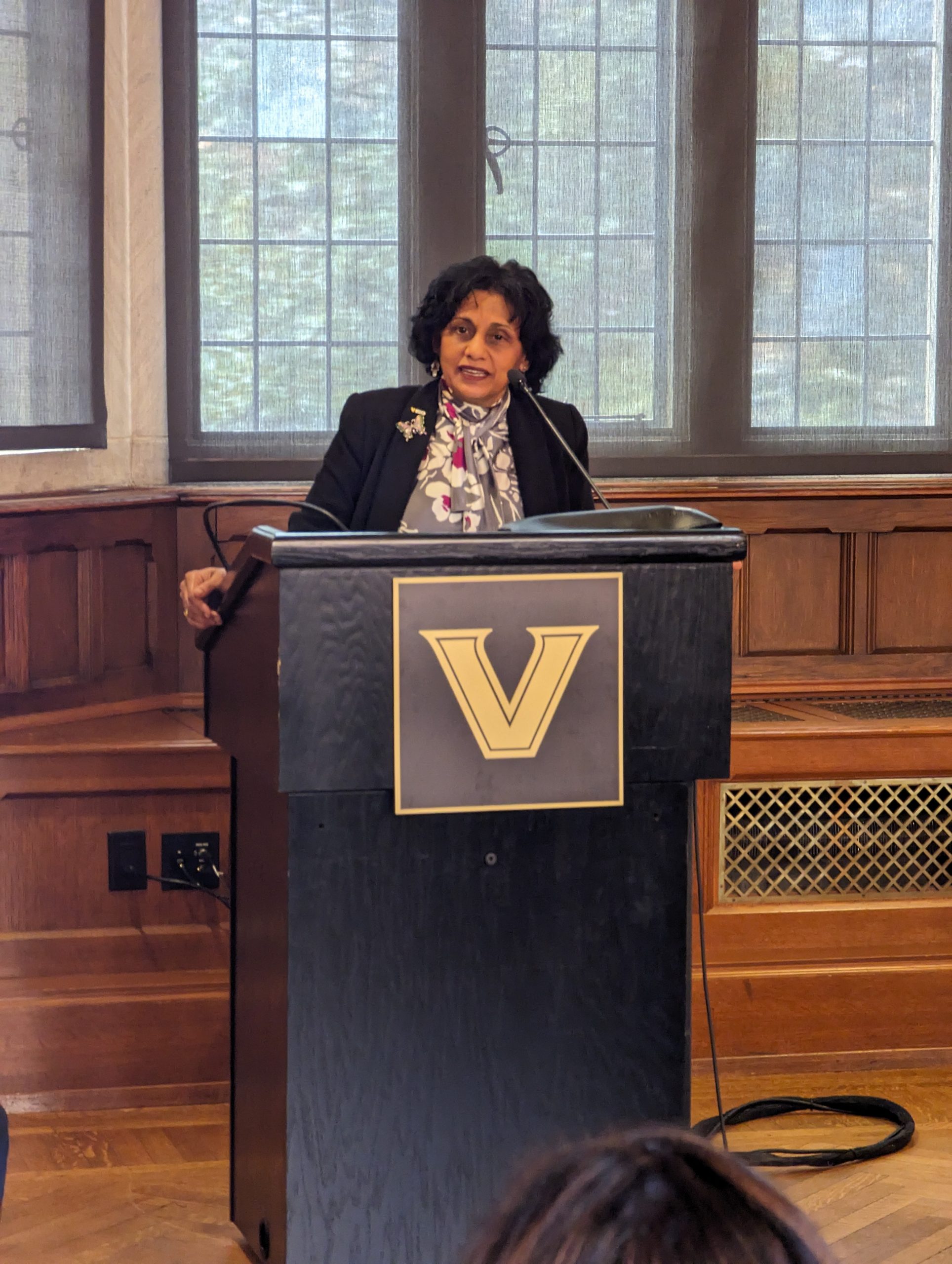NSF
-

Spring 2024 Scaling Success awardees announced
Vanderbilt's Spring 2024 Scaling Success Grant awards support four innovative research projects, empowering faculty to secure expanded external funding. The grant program, initiated in 2022, has already helped its inaugural awardees obtain prestigious grants. Read MoreJul 23, 2024
-

NSF names 34 Vanderbilt students and alumni as 2024 graduate research fellows
The prestigious fellowship program assists exceptional graduate students pursuing research-based master’s and doctoral degrees across various fields, including science, technology, engineering, mathematics, STEM education and social sciences supported by NSF. Read MoreJun 17, 2024
-

Novel approach to safeguard patient data included among NSF-led National AI Research Resource Pilot
The U.S. National Science Foundation and the Department of Energy recently announced that a team comprised of Vanderbilt’s newly created ADVANCE center and VALIANT lab is among the first round of 35 projects that will be supported with computational time through the National Artificial Intelligence Research Resource Pilot. Read MoreMay 16, 2024
-

Vanderbilt scientists receive National Science Foundation grant to explore RNA behavior
Manuel Ascano, associate professor of biochemistry and pathology, microbiology and immunology, and Dr. Alissa Weaver, Cornelius Vanderbilt Chair and director of the Vanderbilt Center for Extracellular Vesicle Research, are one of nine U.S. research teams awarded funding from the National Science Foundation to more fully understand the potential biotechnological uses of RNA, ranging from crop disease protection to treatments that combat cancer. Read MoreMar 18, 2024
-

Breaking the mold: postdoctoral fellow’s research challenges ecological norms in yeast communities
Kyle David, an NSF postdoctoral fellow in the Rokas lab, and co-authors published a new paper, 'Saccharomycotina yeasts defy longstanding macroecological patterns' in the high-impact journal PNAS. This paper, which looks at the ecology of 186 species of yeast, provides evidence that not all life-forms follow the rules. Read MoreMar 5, 2024
-

Weimer receives NSF CAREER Award to improve safety and efficacy of machine learning, AI systems
James Weimer, assistant professor of computer science and noted medical-device entrepreneur, has received a National Science Foundation CAREER Award to improve the safety and efficacy of systems that use advanced machine learning and artificial intelligence techniques. Read MoreFeb 7, 2024
-

Soheil Kolouri receives NSF CAREER Award to enhance machine learning
Soheil Kolouri, assistant professor of computer science at Vanderbilt University, has received a National Science Foundation CAREER Award to explore ways to make machine learning more efficient and possibly impact the next generation of such methods. Read MoreJan 8, 2024
-

M-TRAIN launches first workshop to boost regional research administration and innovation
The inaugural Middle Tennessee Research Administration and Innovation Network (M-TRAIN) workshop, held at Vanderbilt University and funded by a $100,000 NSF grant, brings Middle Tennessee’s universities together to enhance research administration and foster regional collaboration. Read MoreDec 14, 2023
-

CREST initiative gets grant to energize workforce development, economic growth through regional cross-sector collaborations
Vanderbilt's CREST Initiative unites regional partners to revolutionize workforce development in Tennessee and the Mid-south. The collaborative effort prioritizes economic growth, empowers the local workforce and paves the way for a more inclusive biotech future. Read MoreNov 20, 2023
-

From Scaling Success to NSF: Vanderbilt, Fisk create winning formula in multi-messenger astronomy
The Fisk-Vanderbilt Master’s-to-Ph.D. Bridge Program, emphasizing multi-messenger astronomy, utilized strategic funding from a Scaling Success Internal Award to secure a $1.7 million NSF grant. This collaborative journey, focusing on inclusive STEM education and innovative training approaches, highlights the power of adaptability and vision in research endeavors. Read MoreOct 12, 2023
-

A $3M NSF grant to advance biomanufacturing could help establish an innovative method to deliver medicines to cells
“Biomanufacturing is a growing but critical field that is reshaping how we diagnose and treat some of the most devastating diseases known to humanity,” said Jamey Young, Cornelius Vanderbilt Professor of Chemical and Biomolecular Engineering and principal investigator on the four-year grant. “Vanderbilt is uniquely well-suited to help advance the future of biomanufacturing, given our... Read MoreSep 29, 2023
-

Vanderbilt, Tennessee State and Fisk partner to launch Middle Tennessee Research Administration and Innovation Network with $100K NSF grant
The National Science Foundation has granted $100,000 to Vanderbilt, Fisk and Tennessee State University to launch the Middle Tennessee Research Administration and Innovation Network, which focuses on developing regional research administration staff through a series of workshops to address disparities in regional research activity. Read MoreSep 20, 2023
-

Multi-institutional Center for the Mechanical Control of Chemistry awarded $20M CCI grant
The Center for the Mechanical Control of Chemistry received a $20 million grant from the National Science Foundation to support its expansion to 11 partner institutions, including Vanderbilt University. Read MoreSep 13, 2023
-

Success Story: From Vanderbilt’s Seeding Success Grant to National Science Foundation recognition
The Seeding Success Grant at Vanderbilt University has helped propel ADVISER, an innovative software platform created by David Hyde, assistant professor of computer science, to earning National Science Foundation funding. ADVISER is designed to democratize access to high-end cloud computing, and the new NSF grant applies it to climate change research. Read MoreAug 15, 2023
-

NSF grant supports alliance’s effort to boost AI-imaging in Middle Tennessee
Vanderbilt researchers are part of an alliance supported by the National Science Foundation that seeks to build on the use of artificial intelligence in medical imaging in Middle Tennessee. Read MoreAug 8, 2023
-

Padma Raghavan appointed to Tennessee Nuclear Energy Advisory Council
Vanderbilt University Vice Provost for Research and Innovation Padma Raghavan has been appointed to the Tennessee Nuclear Energy Advisory Council. Raghavan’s expertise and leadership will contribute to Tennessee’s initiatives in nuclear innovation and investment. Her appointment aligns with Vanderbilt’s broader efforts to foster economic development and energy advancements. Read MoreAug 1, 2023
-

Showcase launches TEAM TN, a collaboration of Vanderbilt, UT and Tennessee partners to advance next-generation transportation
Vanderbilt University collaborates with the University of Tennessee and more than 100 partner organizations to launch the Advancing Technology-Enabled Mobility Solutions (TEAM TN) initiative. TEAM TN aims to advance mobility solutions, spark innovation and make Tennessee a key player in the $2 trillion global transportation economy. Read MoreJul 6, 2023
-

Scientists led by Vanderbilt astronomer Stephen Taylor use exotic stars to tune in to ‘hum’ from cosmic symphony
Led by Stephen Taylor, assistant professor of physics and astronomy, a collaborative effort across 88 institutions has identified evidence of slowly undulating gravitational waves passing through our galaxy. Read MoreJun 28, 2023
-

Service providers charged with keeping kids safe are cautious but see value in AI tool to track risky behavior online
As part of the National Science Foundation I-Corps program, a team of researchers led by Pamela J. Wisniewski conducted interviews with 37 social service providers across the U.S. who work with underprivileged youth to determine what online risks most concern them and if they see value in using AI as a solution for automated online risk detection. Read MoreJun 7, 2023
-

Vanderbilt part of coalition awarded $1M engine development award to advance sustainable manufacturing and supply chain innovation
Vanderbilt has received funding from the National Science Foundation's Regional Innovation Engines program to develop a strategy for closed-cycle manufacturing to reduce waste and increase efficiencies across various sectors, including automotive, aerospace, energy, food and beverage, and materials in Tennessee and Kentucky. Read MoreMay 18, 2023